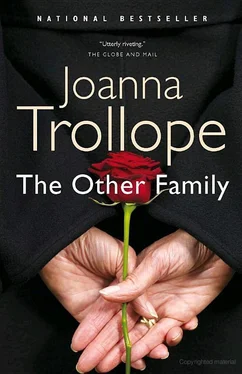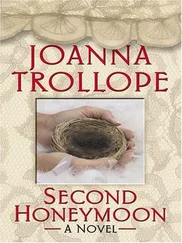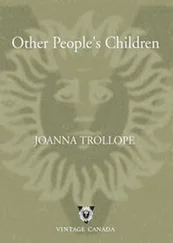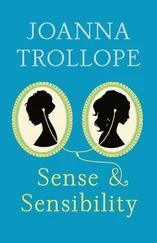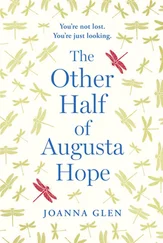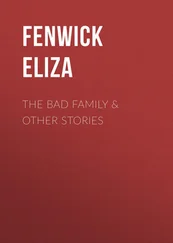Joanna Trollope - The Other Family
Здесь есть возможность читать онлайн «Joanna Trollope - The Other Family» весь текст электронной книги совершенно бесплатно (целиком полную версию без сокращений). В некоторых случаях можно слушать аудио, скачать через торрент в формате fb2 и присутствует краткое содержание. Жанр: Старинная литература, на английском языке. Описание произведения, (предисловие) а так же отзывы посетителей доступны на портале библиотеки ЛибКат.
- Название:The Other Family
- Автор:
- Жанр:
- Год:неизвестен
- ISBN:нет данных
- Рейтинг книги:5 / 5. Голосов: 1
-
Избранное:Добавить в избранное
- Отзывы:
-
Ваша оценка:
- 100
- 1
- 2
- 3
- 4
- 5
The Other Family: краткое содержание, описание и аннотация
Предлагаем к чтению аннотацию, описание, краткое содержание или предисловие (зависит от того, что написал сам автор книги «The Other Family»). Если вы не нашли необходимую информацию о книге — напишите в комментариях, мы постараемся отыскать её.
The Other Family — читать онлайн бесплатно полную книгу (весь текст) целиком
Ниже представлен текст книги, разбитый по страницам. Система сохранения места последней прочитанной страницы, позволяет с удобством читать онлайн бесплатно книгу «The Other Family», без необходимости каждый раз заново искать на чём Вы остановились. Поставьте закладку, и сможете в любой момент перейти на страницу, на которой закончили чтение.
Интервал:
Закладка:
Amy leaned over Chrissie’s shoulder.
‘What?’
‘In the eyes of the law,’ Chrissie said, ‘living with Dad for twenty-three years doesn’t make me his wife.’
Amy felt suddenly tearful. She said childishly, ‘ Why didn’t you marry him?’
Chrissie said, looking at the screen, ‘I can’t talk about it now, Amy. I’m sorry, but I’m angry, and I’l say the wrong thing and then I’l wish I hadn’t.
We’l talk about it as soon as I can.’
‘They knew,’ Amy said. ‘Why didn’t I?’
‘I don’t know,’ Chrissie said. ‘You didn’t ask. I wish you had. I wish I’d told you. I wish we’d al talked about it, al of us, with Dad. When Dad was stil here. I wish it wasn’t too late.’
Amy moved sideways and perched on the edge of the desk. She began to pluck at the strands of her hair.
‘Did you want to?’
‘Want to what?’
‘Did you want to marry Dad?’
Chrissie gave a little sigh.
‘Oh yes.’
‘Why didn’t you ask him?’
‘Amy,’ Chrissie said, ‘I told you. I can’t talk about it now. I’m wrestling with knowing that I’m what the law cal s a cohabitee and therefore not entitled to the status and privileges, in a tax sense, of being a married woman, and that is enough . Just now, that is quite enough for me to cope with.’
‘So I’m il egitimate.’
Chrissie didn’t look at her.
‘Don’t be melodramatic. Nobody uses that word now. You were wanted and adored and you know who both your parents are and that’s more than a lot of people can say. Society and the law often take a long time to catch up with how people behave.’
Amy said, into her handful of hair, ‘Don’t you care?’
Chrissie put a hand out and held the edge of Richie’s old cardigan.
‘Darling, I care so much about so much at the moment that I sometimes think I might just fal to pieces.’
‘Don’t,’ Amy said suddenly.
‘I won’t. I can’t. There’s just so much—’ She stopped. She took her hand away from the cardigan and put it briefly across her eyes. ‘It’s just such a lot to take in, Amy. Such a lot that’s different, that – that’s not what I thought it was, believed it was—’ She stopped again.
Amy pushed her hair back over her shoulders. She said, as a statement, ‘The piano.’
Chrissie looked down at her keyboard.
‘It was his voice,’ she said. ‘It – the piano – was everything, real y, not just his stage name but how he thought of himself, how he was. I can’t believe he did that, I can’t believe he wanted to do that and didn’t tel me, left me to find out like that, just left me to find out. Too late, like everything else. And I’m picking up the pieces.’ She glanced up at Amy and put her hand out again, to take Amy’s this time. ‘Sorry, darling. I shouldn’t be talking to you like this. I shouldn’t be thinking like this. It isn’t fair. It isn’t fair to you. Or me. It’s classic three-in-the-morning thinking. Sorry. So sorry.’
Amy said slowly, ‘Perhaps she won’t want it—’
‘What?’
‘Perhaps she won’t want the piano. Perhaps,’ Amy said a little faster, ‘perhaps she’s angry with him too.’
Chrissie gave another sigh.
‘I don’t real y want to know. I don’t care what she feels, I don’t want to have to consider her.’
‘OK,’ Amy said. She took her hand out of her mother’s and folded her arms. ‘OK. But I’m angry.’
Chrissie looked down at her keyboard.
‘Are you listening?’ Amy demanded.
‘Of course—’
‘I’m angry,’ Amy said, almost shouting. ‘I’m angry at you and I’m even angrier at him. How could he? Why did he treat me like a little kid, why did you both play your make-believe and think it wouldn’t affect me? What were you thinking of?’
‘I suppose we weren’t real y thinking—’
‘How dare you,’ Amy said, suddenly not shouting, but almost whispering. ‘How dare you. How dare he .’
‘Wel ,’ Chrissie said slowly, ‘if it’s any consolation, I’m paying for it now. Aren’t I? No income from Dad, this tax, everything frozen til after probate
—’
‘This isn’t about you.’
‘No,’ Chrissie said. ‘Sorry. Sorry, darling. It’s just that—’
‘It’s about me,’ Amy said. ‘And Tamsin, and Dil y. And him.’
‘Dad?’
‘No,’ Amy said. She sighed. ‘No. Not Dad. Not you or Dad. Not parents. It’s about the children, isn’t it? The three of us, and him. In Newcastle.’
She bent towards her mother and hissed at her. ‘Isn’t it?’
CHAPTER FIVE
‘Where wil you put it?’ Scott said.
Margaret was standing by the sofa in the bay window of her sitting room, gazing out across the undulating grass of Percy Gardens, towards the sea. The sea was dark today, despite a blue sky, dark and shiny, and from this distance, calm enough only to shimmer. A few hefty North Sea gul s were picking their way around the grass, and there was an old man going past, very slowly, with a stick in one hand and a plastic shopper in the other. Apart from them, there was no sign of life, no people, no shipping. Dawson, stretched along the back of the sofa, was sleeping the sleep of one who knows there is nothing worth staying awake for. ‘Put what?’ Margaret asked absently. She was in some kind of mild reverie. She’d been in it, Scott thought, al weekend, abstracted and peculiar, with a groove on her left hand where her wedding ring had been. When he’d asked her where it was, she’d looked at her hand as if it was nothing to do with her and said, ‘Oh, that’s nothing, pet. It was just time. Time to take it off.’
Scott said loudly, ‘Where wil you put the piano?’ Margaret turned round, without hurry. She looked at the room, at her sofa and chairs covered in linen union printed with peonies, at her occasional tables and lamps, at her brass fire irons hanging on their little tripod in the fireplace, at the glass-fronted display cabinet ful of the porcelain figures she used to col ect, shepherdesses dreaming on picturesque tree stumps, Artful Dodger boys playing with spaniels.
‘Wel ,’ Margaret said, ‘there isn’t room in here.’
Scott sighed.
He said, ‘There is if you move stuff.’
Margaret made a vague gesture. ‘It would be so dominating—’
Scott put his hands in his jeans pockets, and hunched his shoulders. He studied the toes of his trainers. He counted, with effort, to twenty. He wanted to say, with some force, that having the Steinway back was not just important because of what it indicated about his father’s abiding remembrance of them – after al – but also because it would mean that he, Scott, could play it. And that, if he played it in his mother’s sitting room, his mother might remember, at long last, that he, Scott, could actual y play. Rather wel . It might make her stop insisting that Richie was unique, that nobody could play like he could, that Scott had singularly failed to inherit his talent as wel as his looks. Scott didn’t even think his mother knew that he stil played, or recal ed that the modest Yamaha keyboard was stored in the flat in Newcastle behind the black sofa, and not only did Scott play it, often, but he also played for friends, and the friends told him he was fantastic and he ought to do something about it. Scott knew he wasn’t fantastic.
He didn’t want his mother to tel him he was fantastic: he just wanted her to acknowledge that he could play, and to be interested in his playing. He wanted his father’s Steinway in his mother’s sitting room so that sometimes, on these laborious weekends together, they could communicate, and probably more satisfactorily without words. He wanted to play the piano for her, his father’s piano, so that in some obscure way they could be a family again.
Читать дальшеИнтервал:
Закладка:
Похожие книги на «The Other Family»
Представляем Вашему вниманию похожие книги на «The Other Family» списком для выбора. Мы отобрали схожую по названию и смыслу литературу в надежде предоставить читателям больше вариантов отыскать новые, интересные, ещё непрочитанные произведения.
Обсуждение, отзывы о книге «The Other Family» и просто собственные мнения читателей. Оставьте ваши комментарии, напишите, что Вы думаете о произведении, его смысле или главных героях. Укажите что конкретно понравилось, а что нет, и почему Вы так считаете.
